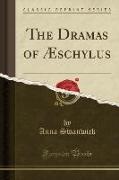Ulteriori informazioni
Excerpt from The Dramas of schylus
Now, this lyrical element of ancient poetry, not admitting of translation, requires to be born anew, and for this purpose we have a most felicitous adjunct in rhyme, which, when judiciously employed, may be regarded as a musical accompaniment, pervading the choral harmonies, enhancing their beauty, and at the same time serving to mark the time.
About the Publisher
Forgotten Books publishes hundreds of thousands of rare and classic books. Find more at www.forgottenbooks.com
This book is a reproduction of an important historical work. Forgotten Books uses state-of-the-art technology to digitally reconstruct the work, preserving the original format whilst repairing imperfections present in the aged copy. In rare cases, an imperfection in the original, such as a blemish or missing page, may be replicated in our edition. We do, however, repair the vast majority of imperfections successfully; any imperfections that remain are intentionally left to preserve the state of such historical works.
Info autore
Anna Swanwick (1813 - 1899) was an English author and feminist. Miss Swanwick's life was divided between literary pursuits and active philanthropy. She never sought publicity, but her example and influence had an important and invigorating effect on women's education and on their position in the community. She signed John Stuart Mill's petition to parliament in 1865 for the political enfranchisement of women. The University of Aberdeen conferred on her the honorary degree of LL.D. She was a Unitarian. Miss Swanwick was the centre of a large circle of distinguished friends, who included Crabb Robinson, Tennyson, Browning, Gladstone, James Martineau, and Sir James Paget, and these, with many others, were frequent visitors at her house. Her marvelous memory made her a delightful talker, and she was full of anecdotes in her later years about the eminent persons she had known.

